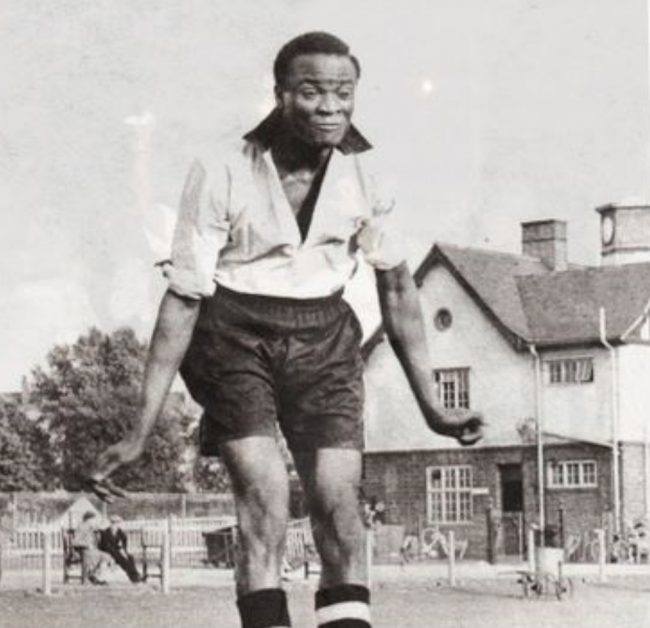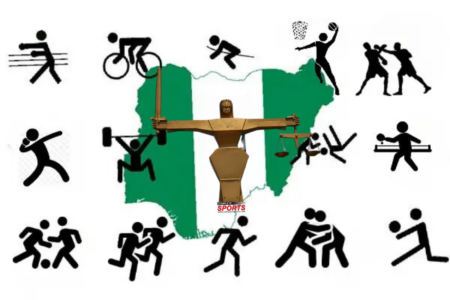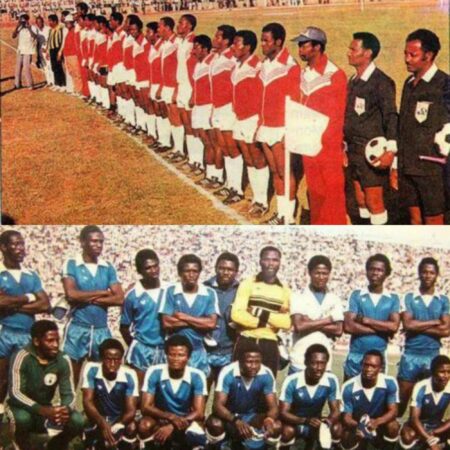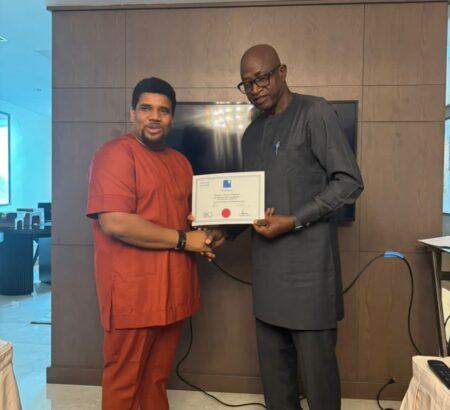He was an enigma.
Last Sunday, ‘Ara’ died as quietly as he had lived his entire life.
Otunba Deji Osibogun, my friend based in Ibadan, Nigeria, called to give me the sad news.
Some time ago, for some reason, Deji and I had discussed Ara, a nickname this prodigious football genius inherited from his late father, probably the most famous Nigerian footballer in the history of the game in the country – Tesilimi Thunder Balogun [pictured above]. For some reason (I don’t remember why now), his name came up and we both wondered where he was hibernating since he left for the USA.
On the day I could have met his more famous father for the first time, Tesilimi Thunder Balogun died.
My team, Housing Corporation FC Ibadan were to play against Mighty Jets FC of Jos in a friendly football match at the famous Liberty Stadium, Ibadan, the supreme theatre of football at the time in Nigeria, when it was announced as the match was about to begin that Thunder Balogun died in his sleep whilst taking his regular afternoon siesta in readiness to go and watch the match.
We all observed a minute’s silence in honour of the legendary football player whose career was a compendium of incredulous, mystical stories.
Tesilimi Balogun was one of the first Nigerians to play professional football in the United Kingdom. Playing without any shoes, with only bandages strapped to his feet, his performances during the famous 1949 UK tour by a selected team of Nigerian football players had impressed some English coaches enough to be recruited into Blackpool FC after the tour. Teslimi Balogun was a member of thatpioneer national team of Nigeria. He was also its best player.
Also Read – Odegbami: Allen Onyema – Honouring Unsung Heroes Of Nigerian Sport
There were mythical tales about him and his skills that still sustain till this day; how he shot a ball into the air and it never came back to earth; how he struck a ball so hard it went through the opposing goalkeeper’s stomach and killed him; how he dribbled all eleven opposing players and scored a goal; and so on.
Those that were around and watched Thunder play swore that he was as good as the impossible stories told about him.
After spending many years in the UK, he returned to Nigeria and started to coach secondary school students in various schools in Western Nigeria and some clubs. His first son, Tunde, was one of those he coached.
Tunde was a carbon copy of his father as I was told by those that knew both of them. He was lanky, over 6 ft tall, with slightly bowed legs, handsome, with darting eyes and a happy smile plastered on his face.
I never got to meet his father, but I met the son when various sports teams were assembled and camped in preparation for the 1975 National Sports Festival. He was a member of that extremely talented Western Academicals football team that included Taiwo Ogunjobi, Chris Okoro, Best Ogedegbe, and so on.
At the time, Tunde’s story was all over the Ibadan football circuit. He had been mesmerising as a student of Olivet’s High School, Oyo, Aiyetoro Comprehensive High School and, Federal Government College, Ibadan.
Tunde had both a reputation and a followership. His father had coached and taught him the art of dribbling. So, stories abounded of how his father would take out bets with friends about how and when, during a match, that his son would score a goal.
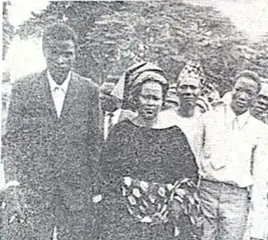
Tunde mesmerised opposing defenders everywhere he played in Ibadan then. He even played briefly for Water Corporation FC, the closest and fiercest rivals of Shooting Stars FC shortly after I joined the team.
The first time I physically saw him was in the Western Academicals.
As a result of his reputation, I started observing him. At training sessions, Tunde stood out like a sore thumb. His fine athletic frame, tall and gangly, contrasted with everything he did. He was always at the rear of his jogging colleagues during warm ups. He was nonchalant to every part of training sessions except when taking shots at goal, or bending balls beyond the goalkeepers. Many who knew his father swore Tunde inherited most of his skills that were out of this world from his old man. Tunde, on the ball, could go past any defender with a body swerve delivered from a distance. He would leave defenders for dead on their feet with his lightening acceleration off the ball from a standing-still position. He reminded me of present-day Mbape.
I don’t think Tunde loved football in the same breath as did Muda Lawal, or Rashidi Yekini who would almost go to bed with their balls by their side, trained for endless hours, and would chase after every ball when they lost it. Tunde was the most reluctant genius I knew.
He exercised as if he was being punished. He avoided training sessions and would always be the last to appear on the training ground. He had an excuse not to do physical or tactical training. He was not your test-book team player, and a nightmare for coaches that did not know how to use him.
Yet, few coaches could let him out of their team because whenever he got the ball on the field to play, he never wasted it. He would always create some magic. He could do anything with the ball. He was a pure dribbling genius. In all my life watching players dribble with the ball, not even Ronaldinho, or Jay Jay Okocha, two of the greatest exponents of the art of dribbling, compare to Ara.
This is no exaggeration, but Ara was a dribbling and goalscoring machine. Hisbody swerves were mesmerising and beautiful to watch. His shots at goal were always measured, deliberate and deadly accurate. From free-kicks and spot kicks he was as deadly as Ronaldo, Beckham and Lionel Messi.
Also Read – Odegbami: A Painful Death, A Sweet Victory And The FESTAC Of Sports
Every coach complained about his attitude to training and individualism, but none faulted his genius in front of goal.
Incidentally, Tunde could not hurt a fly. He was in his own world. The ‘annoying’part of his character was that he never spoke back at anyone, for anything. He was shy and timid. He walked alone. He trained alone, at his own pace and time. He did everything in ‘silence’, a gentle smile dancing on his face, his only companion.
In the two or three years that I interacted with him, I never heard his voice rise above a whisper. I never saw or heard him hold a lengthy conversation with anyone. His few friends and colleagues in the academicals team, including Taiwo Ogunjobi, swore that he could crack up some really crazy jokes whenever he was in the mood. Those moments were very few and far between.
He never granted any press interviews. He never also took pictures. Every reporter wanted to speak with him and ask him about his weird ways and his genius on the football field. He never granted their wish.
He was invited to the national Academicals squad and he played for Nigeria in the famous Ghana/Nigeria Academicals encounters in 1975 led by Taiwo Ogunjobi. They defeated Ghana both at home and away in Accra, Ghana. Tunde was thetormentor-general of the Nigerian team.
He was so good as a student/footballer that during the first exodus of players to the United States to study and play their football, he was one the first to secure an admission and a scholarship. He went to Howard University, a Black institution that admitted very many Nigerian star-players.
Had he stayed back in Nigeria, without question, he would have joined us and played in the senior national team. I can picture his combination with Thompson Usiyen and start to dream the possibility of the deadliest attacking pair in Nigeria’s history. What a lethal striking partnership that would be.
As quickly as he lit the candle of his life in the Nigerian football space, so did his migration to the States dim it. For decades no one heard anything about him, not even when he returned to Nigeria and returned to the cocoon of his private interests and ‘silent’ life.
Last Sunday, that candle was finally extinguished by the Creator of the Universe.
This is my little tribute to that gentle football genius who lived and loved his ‘silence’ – Tunde Ara Balogun.
Segun Odegbami


